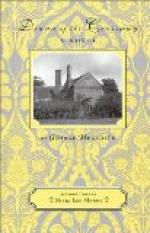Laws as the simple beginning of the grants due to
the people. She had her ideas, of course, from
that fellow Redworth, an occasional visitor at Copsley;
and a man might be a donkey and think what he pleased,
since he had a vocabulary to back his opinions.
A woman, Sir Lukin held, was by nature a mute in
politics. Of the thing called a Radical woman,
he could not believe that she was less than monstrous:
‘with a nose,’ he said; and doubtless,
horse teeth, hatchet jaws, slatternly in the gown,
slipshod, awful. As for a girl, an unmarried,
handsome girl, admittedly beautiful, her interjections,
echoing a man, were ridiculous, and not a little annoying
now and them, for she could be piercingly sarcastic.
Her vocabulary in irony was a quiverful. He
admired her and liked her immensely; complaining only
of her turn for unfeminine topics. He pardoned
her on the score of the petty difference rankling
between them in reference to his abandonment of his
Profession, for here she was patriotically wrong-headed.
Everybody knew that he had sold out in order to look
after his estates of Copsley and Dunena, secondly:
and in the first place, to nurse and be a companion
to his wife. He had left her but four times in
five months; he had spent just three weeks of that
time away from her in London. No one could doubt
of his having kept his pledge, although his wife occupied
herself with books and notions and subjects foreign
to his taste—his understanding, too, he
owned. And Redworth had approved of his retirement,
had a contempt for soldiering. ’Quite as
great as yours for civilians, I can tell you,’
Sir Lukin said, dashing out of politics to the vexatious
personal subject. Her unexpressed disdain was
ruffling.
‘Mr. Redworth recommends work: he respects
the working soldier,’ said Diana.
Sir Lukin exclaimed that he had been a working soldier;
he was ready to serve if his country wanted him.
He directed her to anathematize Peace, instead of
scorning a fellow for doing the duties next about him:
and the mention of Peace fetched him at a bound back
to politics. He quoted a distinguished Tory
orator, to the effect, that any lengthened term of
peace bred maggots in the heads of the people.
’Mr. Redworth spoke of it: he translated
something from Aristophanes for a retort,’ said
Diana.
‘Well, we’re friends, eh?’ Sir Lukin
put forth a hand.
She looked at him surprised at the unnecessary call
for a show, of friendship; she touched his hand with
two tips of her fingers, remarking, ‘I should
think so, indeed.’
He deemed it prudent to hint to his wife that Diana
Merion appeared to be meditating upon Mr. Redworth.




